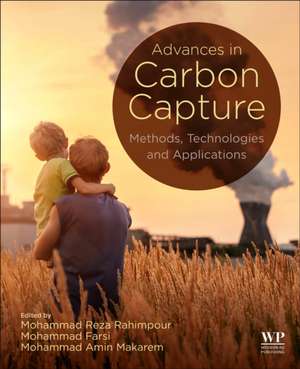Advances in Carbon Capture: Methods, Technologies and Applications
Editat de Mohammad Reza Rahimpour, Mohammad Farsi, Mohammad Amin Makaremen Limba Engleză Paperback – 7 aug 2020
- Explores key CO2 separation and compare technologies in terms of provable advantages and limitations
- Analyzes all critical CO2 capture methods in tandem with related technologies
- Introduces a panorama of various applications of CO2 capture
Preț: 1142.31 lei
Preț vechi: 1486.54 lei
-23% Nou
Puncte Express: 1713
Preț estimativ în valută:
218.57€ • 228.23$ • 180.49£
218.57€ • 228.23$ • 180.49£
Carte tipărită la comandă
Livrare economică 08-22 aprilie
Preluare comenzi: 021 569.72.76
Specificații
ISBN-13: 9780128196571
ISBN-10: 0128196572
Pagini: 572
Ilustrații: Approx. 150 illustrations
Dimensiuni: 191 x 235 mm
Greutate: 0.97 kg
Editura: ELSEVIER SCIENCE
ISBN-10: 0128196572
Pagini: 572
Ilustrații: Approx. 150 illustrations
Dimensiuni: 191 x 235 mm
Greutate: 0.97 kg
Editura: ELSEVIER SCIENCE
Public țintă
Researchers seeking new methods and technologies in carbon capture from energy, environmental, chemical engineering backgrounds. These include academic researchers (students, professors, lab technicians, and etc.) and researchers in R&D departments. Engineers working on process design and development. Oil and Gas refineries. Research and Development Groups in chemical plants. CO2 consumption and production units in petrochemical plantsCuprins
Section I: Introduction to CO2 Capture
1. CO2 emission sources, greenhouse gases and global warming effect
2. Challenges on CO2 capture, reuse and conversion
Section II: Absorption Techniques and Methods for CO2 Capture
3. CO2 absorption by common solvents
4. CO2 absorption by ionic liquids and deep eutectic solvents
5. CO2 capture by solvents modified with nanoparticles
6. Encapsulated liquid sorbents for CO2 Capture
7. CO2 capture by Lewis acids and amino acid salts
8. Advances in gas-liquid contactors for carbon capture and challenges in industrialization: packed bed, rotating packed bed, mini and microchannels
Section III: Adsorption Techniques for CO2 Capture
9. CO2 adsorption by carbonaceous materials and nanomaterials
10. CO2 adsorption by conventional and nano-sized zeolites
11. Application of metals, pseudo metals and metal-organic framework (MOF) for capturing CO2
12. CO2 adsorption by functionalized sorbents
13. Advances in CO2 adsorption in swing technologies and challenge on industrialization
14. Phase-change absorption and Processes for CO2 Capture
Section IV: CO2 Capture by Membrane Separation
15. CO2 separation with ionic liquid membranes
16. Zeolite and Alumina based membranes for CO2 capture
17. Polymeric membranes for CO2 separation
18. An Overview of Gas-Liquid Hollow Fiber Polymeric Membrane Contactor for CO2 Absorption-Stripping
19. MOF mixed matrix membranes for CO2 separation
20. Challenges on industrialization of CO2 Capture by Membrane
Section V: Biological techniques for CO2 capture
21. CO2 capture using microalgae
22. CO2 capture using enzymes
23. CO2 capture using bacteria
24. Challenges on industrialization of biotechnological CO2 capturing techniques
Section VI: Applications of CO2 Capture
25. CO2 removal from biogas and syngas
26. CO2 removal from natural gas
27. Integration of CO2 capture and conversion
28. CO2 removal from flue gas
29. CO2 removal from air
1. CO2 emission sources, greenhouse gases and global warming effect
2. Challenges on CO2 capture, reuse and conversion
Section II: Absorption Techniques and Methods for CO2 Capture
3. CO2 absorption by common solvents
4. CO2 absorption by ionic liquids and deep eutectic solvents
5. CO2 capture by solvents modified with nanoparticles
6. Encapsulated liquid sorbents for CO2 Capture
7. CO2 capture by Lewis acids and amino acid salts
8. Advances in gas-liquid contactors for carbon capture and challenges in industrialization: packed bed, rotating packed bed, mini and microchannels
Section III: Adsorption Techniques for CO2 Capture
9. CO2 adsorption by carbonaceous materials and nanomaterials
10. CO2 adsorption by conventional and nano-sized zeolites
11. Application of metals, pseudo metals and metal-organic framework (MOF) for capturing CO2
12. CO2 adsorption by functionalized sorbents
13. Advances in CO2 adsorption in swing technologies and challenge on industrialization
14. Phase-change absorption and Processes for CO2 Capture
Section IV: CO2 Capture by Membrane Separation
15. CO2 separation with ionic liquid membranes
16. Zeolite and Alumina based membranes for CO2 capture
17. Polymeric membranes for CO2 separation
18. An Overview of Gas-Liquid Hollow Fiber Polymeric Membrane Contactor for CO2 Absorption-Stripping
19. MOF mixed matrix membranes for CO2 separation
20. Challenges on industrialization of CO2 Capture by Membrane
Section V: Biological techniques for CO2 capture
21. CO2 capture using microalgae
22. CO2 capture using enzymes
23. CO2 capture using bacteria
24. Challenges on industrialization of biotechnological CO2 capturing techniques
Section VI: Applications of CO2 Capture
25. CO2 removal from biogas and syngas
26. CO2 removal from natural gas
27. Integration of CO2 capture and conversion
28. CO2 removal from flue gas
29. CO2 removal from air
